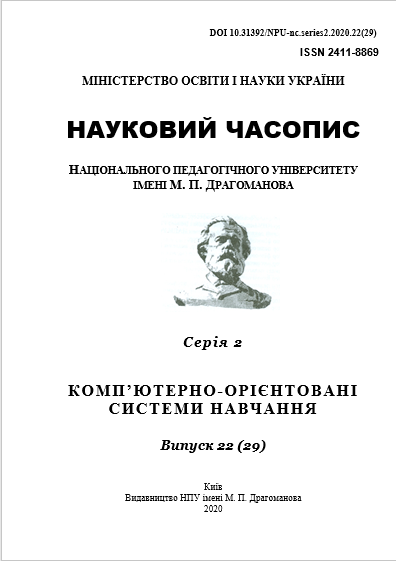ENGINEERING EDUCATION IN SCHOOL: USE OF EDUCATIONAL ROBOTICS IN THE PROCESS OF LEARNING SUBJECTS OF THE NATURAL AND MATHEMATICAL CYCLE
DOI:
https://doi.org/10.31392/NPU-nc.series2.2020.22(29).09Keywords:
variable models, simulation, computer oriented methodical system of research training, intellectual development, pedagogical design, research training, educational robotics, engineering educationAbstract
Тhe Paper describes developed and validated in pilot study variable model of research training subjects of natural-mathematical cycle with pedagogically balanced use of computer-oriented methodical systems. Provided by the concentration of educational resources, the diversity of individual trajectories of development of the individual student and the results of the formation of the necessary interdisciplinary competences and metapragmatic; accessibility and equality of opportunity of students in training; the orientation of the content, forms and technologies of training students to integrate educational, scientific, research, production in terms of research training.
Carried out detailed analysis of the ways of implementing educational robotics and digital laboratory facilities in institutions of General education and the selection of optimal paths in the context of continuity of education. Offers recommendations resulting from the testing of optional courses in the educational process and extracurricular activities, that content is harmonized with existing programs of subjects of natural-mathematical cycles. For the organization of cognitive activity of students in the field of educational robotics offers a number of constructors that allow a student to gather enough structure to connect sensors and motors to make the program and run the robot model. Implemented the lessons learned from the pilot study on the implementation and use of STEM approaches in the educational process and extracurricular activities in the context of continuity of education.
The Study focuses on a pressing theoretical problem – the problem of psychological nature and conditions of intellectual development. The direction of such research is of fundamental nature, since we are talking about developing a new concept for the development of children's intelligence during a research study of subjects of natural-mathematical cycle in the school. Calculating the correlation between the indicators of benefits in the students ' attitude to use of information resources and levels of intellectual development of students to particular groups of information resources used to perform correction of the author's technique of research training with the aim of pedagogically appropriate and methodologically motivated selection of educational resources to minimize contradictions with regard to levels of intellectual development of pupils, specific groups of students.
The materials are intended for teachers, will be useful to teachers and students of pedagogical universities.

